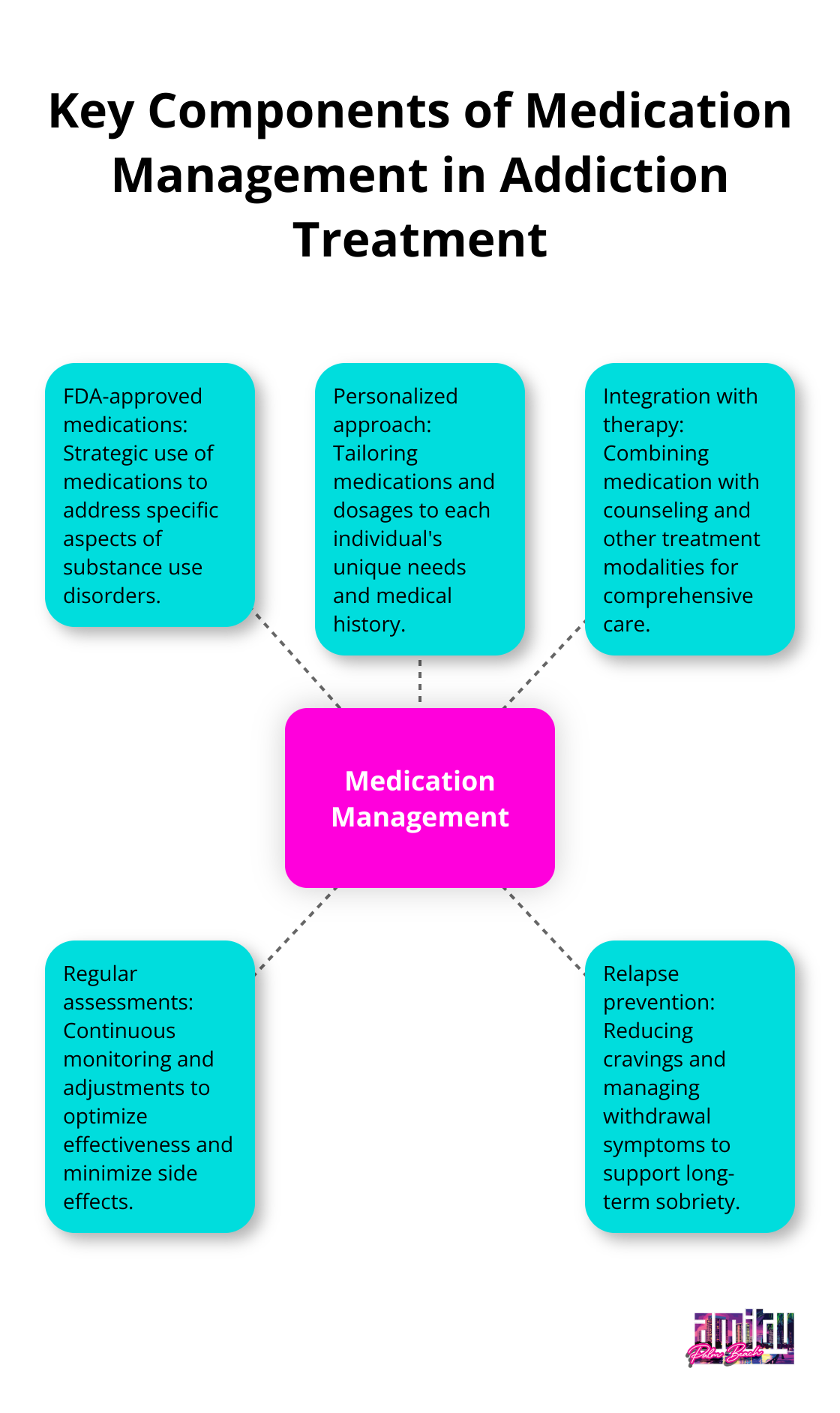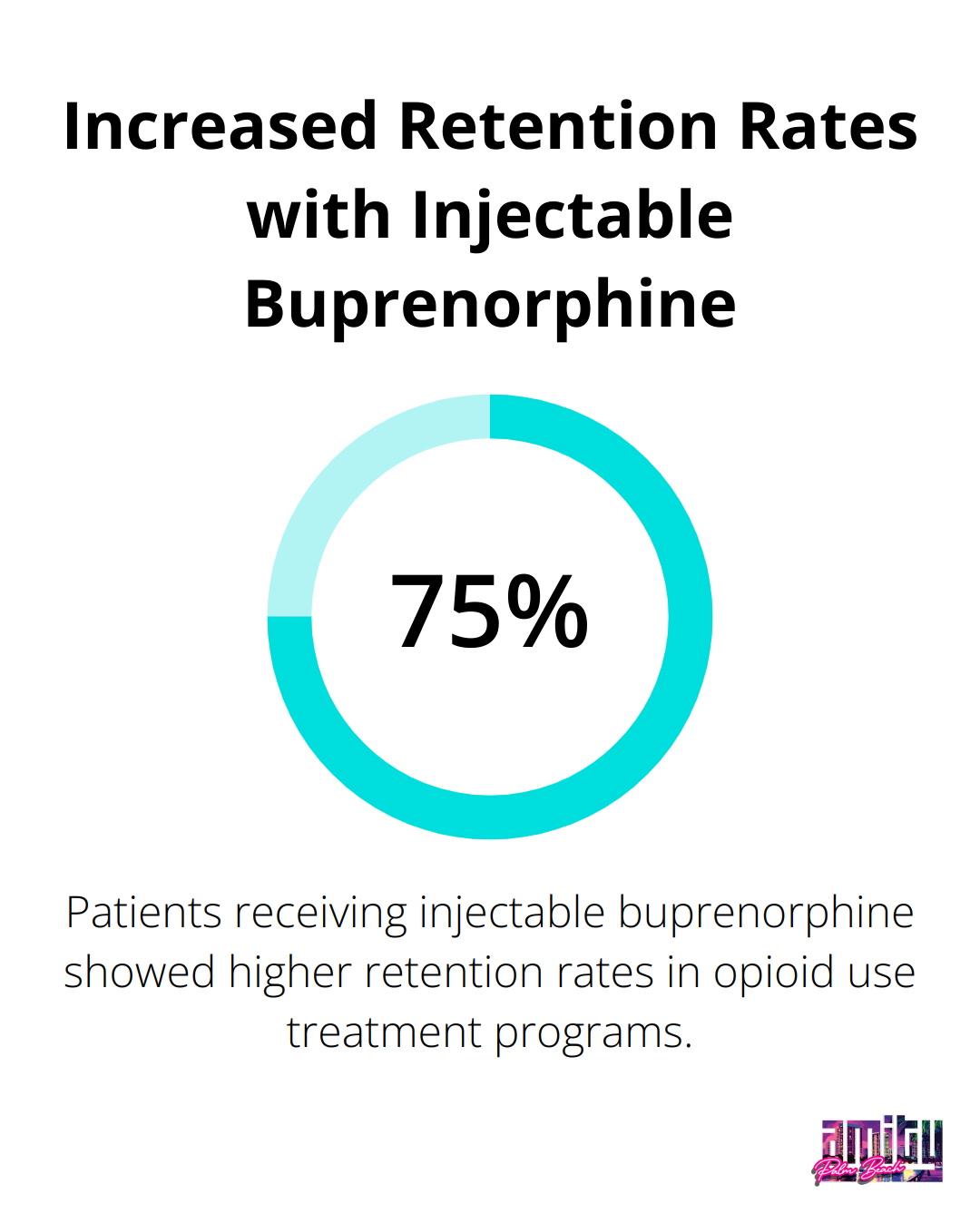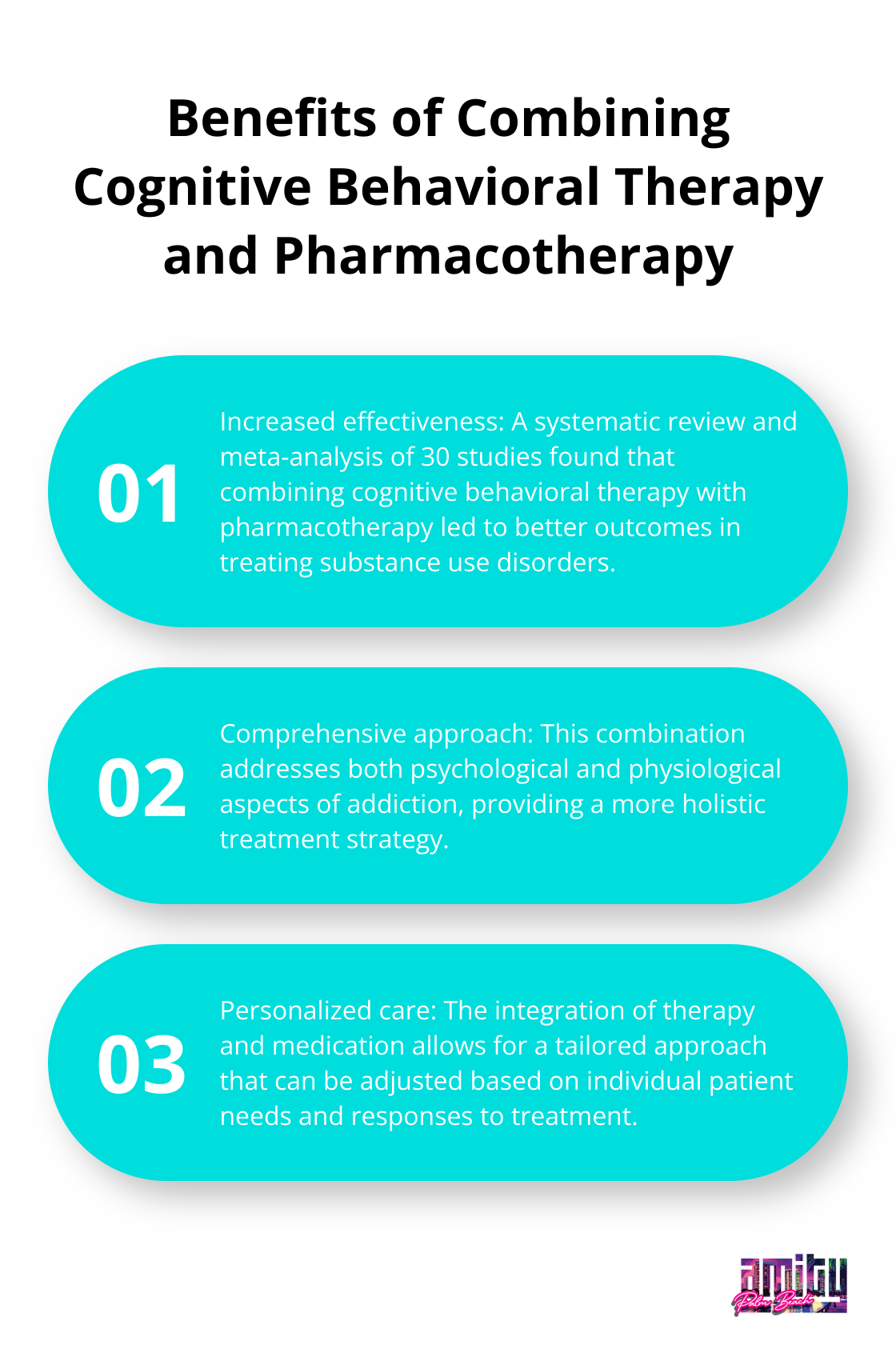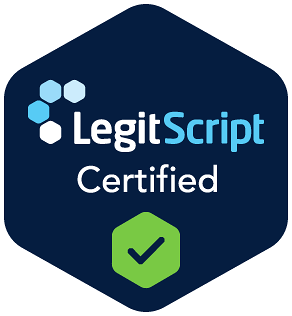At Amity Palm Beach, we understand the critical role of medication management in addiction recovery.
Proper medication management can significantly reduce withdrawal symptoms, address co-occurring mental health issues, and improve long-term treatment outcomes.
This comprehensive approach combines carefully selected medications with therapy and other treatment modalities, tailored to each individual’s unique needs.
In this post, we’ll explore how effective medication management can optimize recovery and support lasting sobriety.
What is Medication Management in Addiction Treatment?
The Purpose of Medication Management
Medication management forms a cornerstone of effective addiction treatment. It involves the strategic use of FDA-approved medications to address specific aspects of substance use disorders. These medications help reduce cravings, manage withdrawal symptoms, and treat co-occurring mental health conditions. The primary objective is to establish a stable foundation for recovery, enabling individuals to concentrate on therapy and essential lifestyle changes.
Common Medications in Addiction Treatment
The choice of medication depends on the substance of abuse and individual needs. For opioid use disorder, physicians often prescribe buprenorphine and naltrexone. Acamprosate and disulfiram are common choices for alcohol use disorder. To address co-occurring mental health issues, antidepressants or anti-anxiety medications may be necessary (as determined by a qualified healthcare provider).
Integration with Comprehensive Treatment
Medication management doesn’t stand alone. It forms part of a holistic approach that includes therapy, counseling, and lifestyle interventions. Medical teams work in close collaboration with therapists and counselors to ensure that medication management aligns with overall treatment goals. Regular assessments and adjustments optimize the effectiveness of medications while minimizing potential side effects.
Role in Relapse Prevention
Medication management plays a vital role in relapse prevention. The reduction of cravings and management of withdrawal symptoms help individuals maintain sobriety in the critical early stages of recovery and beyond. This support can prove invaluable during challenging periods when the risk of relapse is high.
Personalized Approach
It’s crucial to understand that medication management in addiction treatment is not a one-size-fits-all solution. Healthcare providers tailor specific medications and dosages to each individual’s unique needs, medical history, and recovery goals. This personalized approach maximizes the benefits of medication while ensuring safety and effectiveness.

As we move forward, let’s explore the numerous benefits that proper medication management brings to the addiction recovery process.
How Medication Management Benefits Recovery
Easing the Transition to Sobriety
Medication management helps control withdrawal symptoms and cravings. This approach makes the initial stages of recovery more manageable and increases the likelihood of treatment completion. Various medications and strategies are tailored to alleviate withdrawal symptoms, making the recovery process more comfortable for patients.
Addressing Mental Health Challenges
Many individuals who struggle with addiction also face co-occurring mental health disorders. Medication management allows treatment of both issues simultaneously. Antidepressants or anti-anxiety medications, when appropriately prescribed, can stabilize mood and reduce symptoms that might otherwise trigger substance use. This integrated approach leads to better overall outcomes.
Boosting Treatment Retention
Patients who receive medication management as part of their treatment plan are more likely to stay in recovery programs longer. A retrospective review of an opioid use treatment program revealed an increase in retention rates for those receiving injectable buprenorphine. This extended engagement with treatment services significantly improves the chances of long-term recovery.

Supporting Relapse Prevention
Medication management plays a key role in relapse prevention. The reduction of cravings and stabilization of brain chemistry equips individuals to handle triggers and stressors that might otherwise lead to relapse. Some medications can even block the euphoric effects of opioids, further discouraging use.
Personalized Approach for Optimal Results
Effective medication management requires a tailored approach. Healthcare providers customize specific medications and dosages to each individual’s unique needs, medical history, and recovery goals. This personalized strategy (which considers factors such as metabolism, co-occurring conditions, and potential drug interactions) maximizes the benefits of medication while ensuring safety and effectiveness.
The next chapter will explore the key components that make medication management truly effective in addiction treatment. These elements work together to create a comprehensive, patient-centered approach that supports long-term recovery.
Crafting Effective Medication Management Plans
Comprehensive Assessment: The Foundation of Personalized Care
At Amity Palm Beach, we start with thorough evaluations. Our medical team examines medical history, co-occurring mental health conditions, and genetic factors that might influence medication responses. This detailed approach allows us to create truly individualized treatment plans.
Developing tailored treatment plans relies heavily on these assessments. They ensure that the interventions address both addiction and any co-occurring conditions.
Continuous Monitoring: Adapting to Patient Needs
We don’t just prescribe and forget. Our team conducts regular check-ins to assess medication efficacy, side effects, and overall progress. This vigilant monitoring allows us to make timely adjustments, ensuring optimal results.
Patient Education and Empowerment
We prioritize educating our patients about their medications, potential side effects, and the role these drugs play in their overall treatment plan. This transparency fosters trust and encourages active participation in the recovery process.
Integration with Therapy and Holistic Approaches
We seamlessly integrate pharmacological interventions with various therapeutic modalities. This might include cognitive-behavioral therapy, group counseling, or holistic practices like mindfulness meditation.
Combined cognitive behavioral therapy and pharmacotherapy was associated with increased effectiveness in treating substance use disorders, according to a systematic review and meta-analysis including 30 studies.

Personalized Medication Strategies
Our approach recognizes that each patient’s journey is unique, requiring a tailored strategy that evolves with their progress. We consider factors such as metabolism, co-occurring conditions, and potential drug interactions to maximize benefits while ensuring safety (this personalized approach sets us apart in the field of addiction treatment).
Final Thoughts
Medication management forms a cornerstone of effective addiction treatment. It offers a scientifically-backed approach to recovery, which can reduce withdrawal symptoms, address co-occurring mental health issues, and improve long-term treatment outcomes. The integration of medication management with therapy and other treatment modalities creates a comprehensive strategy that supports lasting sobriety.
At Amity Palm Beach, we emphasize the importance of personalized, evidence-based approaches in addiction care. Our team recognizes that each individual’s journey to recovery requires a tailored medication management plan that evolves with their progress (considering factors such as metabolism and co-occurring conditions). This personalized strategy aims to maximize benefits while ensuring safety.
We encourage those struggling with addiction to seek professional help for medication management in recovery. The complexities of substance use disorders often require expert guidance to navigate safely and effectively. If you or a loved one seek help, don’t hesitate to reach out to addiction treatment professionals who can guide you through the process of medication management and comprehensive care.




